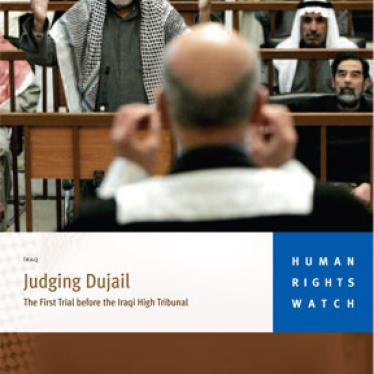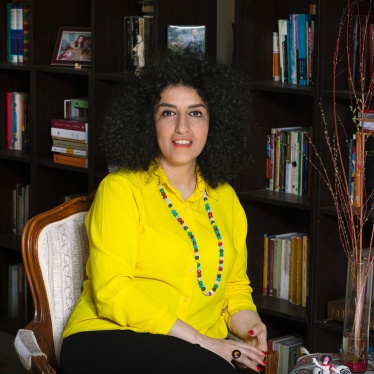The trial of Saddam Hussein and seven other defendants before the Iraqi High Tribunal for crimes against humanity was marred by so many procedural and substantive flaws that the verdict is unsound, Human Rights Watch said in a 97-page report released today. The shortcomings of the trial, for the killings of more than 100 people from the Iraqi town of Dujail, also call into question subsequent proceedings at the tribunal.
“The proceedings in the Dujail trial were fundamentally unfair,” said Nehal Bhuta of the International Justice program at Human Rights Watch and author of the report. “The tribunal squandered an important opportunity to deliver credible justice to the people of Iraq. And its imposition of the death penalty after an unfair trial is indefensible.”
The report, entitled “Judging Dujail: The First Trial Before the Iraqi High Tribunal,” is based on 10 months of observation and dozens of interviews with judges, prosecutors and defense lawyers, and is the most comprehensive analysis to date of the trial. Human Rights Watch, which has demanded the prosecution of Saddam Hussein and his lieutenants for more than a decade, was one of only two international organizations that had a regular observer presence in the courtroom.
The Iraqi High Tribunal was undermined from the outset by Iraqi government actions that threatened the independence and perceived impartiality of the court. Members of parliament and even ministers regularly denounced the tribunal as weak, leading to the resignation of the first presiding trial judge.
“Judging Dujail” reports previously undocumented and serious procedural flaws in the trial, including:
• regular failure to disclose key evidence, including exculpatory evidence, to the defense in advance;
• violations of the defendants’ basic fair trial right to confront witnesses against them;
• lapses of judicial demeanor that undermined the apparent impartiality of the presiding judge; and
• important gaps in evidence that undermine the persuasiveness of the prosecution case, and put in doubt whether all the elements of the crimes charged were established.
The report also shows that the tribunal as an institution has struggled to competently perform basic administrative functions that are essential to a fair and effective trial. It failed to develop effective programs to address the needs of witnesses and victims or to ensure the security of defense lawyers, and ignored the important task of explaining the trial process to the Iraqi population.
The Dujail trial commenced before the Iraqi High Tribunal in Baghdad on October 19, 2005, and ended on July 27, 2006, with a verdict announced on November 5, 2006. Saddam Hussein and two other defendants were sentenced to death by hanging, and four defendants received prison terms ranging from 15 years to life. One defendant was acquitted at the prosecution’s request. The verdict and sentences are currently being appealed to the Appeals Chamber.
The trial concerned the aftermath of an assassination attempt against then-President Saddam Hussein in Dujail in July 1982. Government officials were accused of orchestrating an attack on the town’s inhabitants in revenge for the assassination attempt, resulting in the detention, torture and forced displacement of hundreds, and the deaths of more than 100 boys and men after a summary trial.
“The tribunal failed to meet basic fair trial standards in its first trial. Unless the Iraqi government allows experienced international judges and lawyers to participate directly, it’s unlikely the court can fairly conduct other trials,” said Bhuta.
The tribunal’s statute requires that death sentences be implemented 30 days after the final appeal, and that no commutation is possible. If the death sentence against Saddam Hussein is upheld on appeal, there is a chance that he will be executed before the conclusion of his ongoing trial for genocide against the Kurds.
Human Rights Watch opposes the death penalty as inherently inhumane punishment and says that executing Hussein while other trials are ongoing will also deprive many thousands of victims of their day in court.








